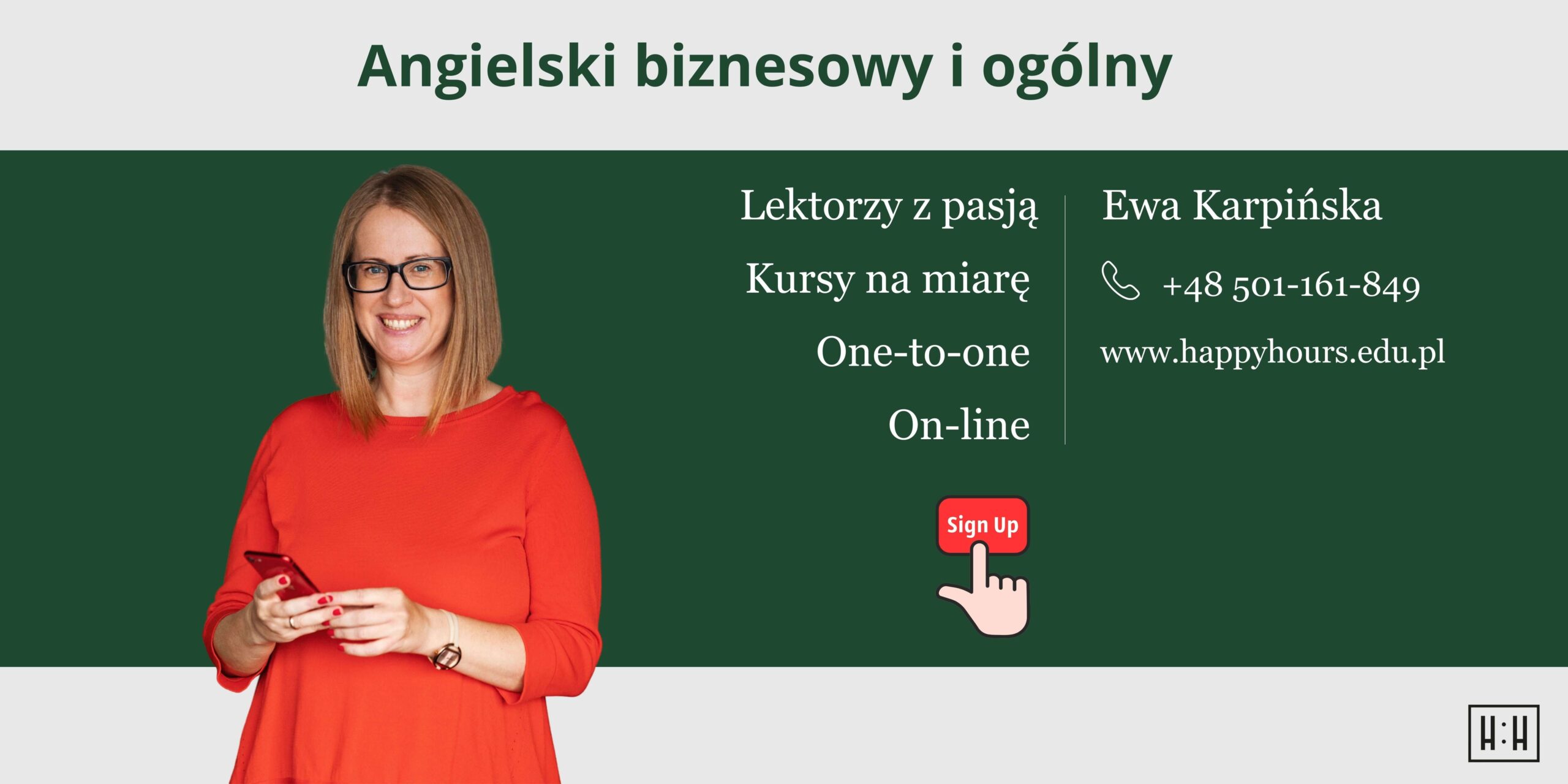Czy wiesz, że:
- 65% ankietowanych mówi po angielsku W PRACY, ale słabo zna słownictwo i gramatykę (gramatyka jest ważna!).
- 98% respondentów uważa, że nauka drugiego języka pomaga w KARIERZE ZAWODOWEJ.
- Osoby, które znają co najmniej dwa języki obce, mają w niektórych rodzajach pracy aż o 20% większe zarobki.
Chcemy wzmocnić Twój angielski, dlatego udostępniamy Ci pierwszą część autorskiego cyklu spójnych postów ENGLISH FOR WORK (na poziomie B1/B2) opublikowanego w mediach społecznościowych na stronach naszej szkoły w czerwcu 2020. Szlifuj z nami swój angielski!
Poniżej znajdziesz pokrótce opracowane następujące tematy: „Welcoming visitors”, „Talking about your job” i „Telephone talk”. Każdy z 3 tematów zawiera zbiór słownictwa, część gramatyczną i zadanie z odpowiedziami. Enjoy 😊.
Pragniesz lepiej mówić po angielsku? Zapisz się do naszej szkoły na indywidualny kurs języka angielskiego online Business English lub General English! Mogą to być zajęcia z native speakerem lub z nauczycielem polskim. U nas uczysz się, czego chcesz, jak chcesz i kiedy chcesz. W przypadku zainteresowania kursem indywidualnym napisz: ewa.karpinska@happyhours.edu.pl.
I. Welcoming visitors
a) Vocabulary booster
- My name’s…. I’m a…. (job title) at… (company name)
- Pleased to meet you.
- It’s a pleasure.
- I’d like to introduce you to… He / she is our Project Manager.
- How was your flight? / How was your trip?
- How are things in London?
- How long are you staying in Poland?
- Is your hotel comfortable?
- Can I get you anything?
- Would you like a drink?
- Can we do anything for you?
- Do you need a hotel / a taxi / any information about… etc.
b) Grammar – question words
Question words such as “when”, “where”, “why”, “how much”, “how many”, “how long” etc. we put before am / are / is / was / were or another auxiliary verb (have, will, can etc.) then we put the subject.
Examples:
How was your flight? How are things in London? Can I get you anything? When will you call her?
If there is no other auxiliary verb, we use do / does / did + infinitive (without to).
Examples: How does he like his job? Why did you call her? What did she do?
c) A challenge – complete the dialog with appropriate words.
A: Hello, (a) …………… to meet you.
B: Thank you for (b) ………………… me.
A: How long are you (c) ………………. here?
B: Just three days.
A: Oh, not long, then. Let me (d) ……….. you to my colleague. Peter, (e) …….. is Angela.
B: (f) …….. to meet you.
Answers: (a) nice / pleased, (b) inviting, (c) staying, (d) introduce, (e) this, (f) nice / pleased
II. Talking about your job
a) Vocabulary booster
- My job is to make sure that the company is producing what people want to buy.
- I’m responsible for
- I have general responsibility for the entire company.
- I lead the team which makes our products.
- I do the bookkeeping and the payroll.
- I deal with our customers.
- I cope with
- I’m in charge of the sales representatives.
- My area of expertise is planning new products.
- My area of responsibility is testing our efficiency.
b) Grammar – words + prepositions
| 1. Accustomed to
2. Aim at 3. Arrive at / in 4. Believe in 5. Careful of / with / about 6. Complain about 7. Composed of 8. Cope with 9. Congratulate on 10. Deal with 11. Different from 12. In charge of |
13. Insist on
14. Interested in 15. Pleased with 16. Prefer to 17. Related to 18. Responsible for 19. Satisfied with 20. Similar to 21. Succeed in 22. Superior to 23. Sure of |
c) A challenge – complete the gaps with appropriate preposition
In my current job I am responsible (a)………….. customer care.
I hate my job. Every day I must deal (b) …………… many complaints.
I fancy being (c) ……….. charge (d) ………………. financial department. I am really good (e) ………. numbers.
Answers: (a) for, (b) with, (c) in, (d) of, (e) at.
III. Telephone talk
a) Vocabulary booster
- It’s… here. Could I speak to…, please?
- Can I speak to someone about…?
- I’m calling in connection with…
- The reason I’m phoning is…
- It’s about…
- Could I leave a message?
- Please ask him / her to call me back.
- Please speak up.
- Please speak more slowly.
- Can you repeat that?
- Thanks for calling.
- Talk to you soon.
b) Grammar – common modals used in questions
| Modal | Concept | Example |
| Can | Ability, permission,
offers |
Can I help you? |
| Could | Possibility, past ability,
permission, requests |
Could I use your phone please? |
| May | Possibility, permission | May I borrow your dictionary? |
| Must | Obligation | Must I chair the meeting? |
| Should | Advice, logical deduction | Should I call her tomorrow? |
| Shall | Offers, suggestions | Shall I order a taxi? |
| Will | Invitations, offers | Will you join us for coffee? |
c) A challenge – put the conversation in the correct order.
- Can you put me through to Peter, please?
- Hi Peter, it’s Max.
- One moment, Mr Owen.
- Do you have a second or do you want me to call later?
- Good morning. Can I help you?
- Can I have your name, please?
- Peter speaking.
- Oh hallo, Max.
- No, now it’s fine.
- Yes, it’s Max Owen.
Answers: 1 – e, 2 – a, 3 – f, 4 – j, 5 – c, 6 – g, 7 – b, 8 – h, 9 – d, 10 – i.
Mam nadzieję, że udało mi się choć trochę wzmocnić Twój angielski 😊.
Chcesz mówić po angielsku jeszcze lepiej? Zapisz się na newsletter, w którym wysyłam dodatkowe autorskie materiały edukacyjne, oraz skorzystaj z oferty bezpłatnych ebooków, które pomogą Ci w nauce angielskiego.
Na koniec pozwól, że się przedstawię: nazywam się Ewa Karpińska.
Od 2006 roku prowadzę szkołę języka angielskiego HappyHours. Oferujemy indywidualne kursy angielskiego szyte na miarę potrzeb oraz kursy dla firm. Obejrzyj film, w którym opowiadam o mojej szkole, kursach i nauczycielach.
Jeśli masz ochotę rozwinąć swój angielski z jednym z moich lektorów, to zapraszam do kontaktu.
Z przyjemnością porozmawiam o Twoich potrzebach!








